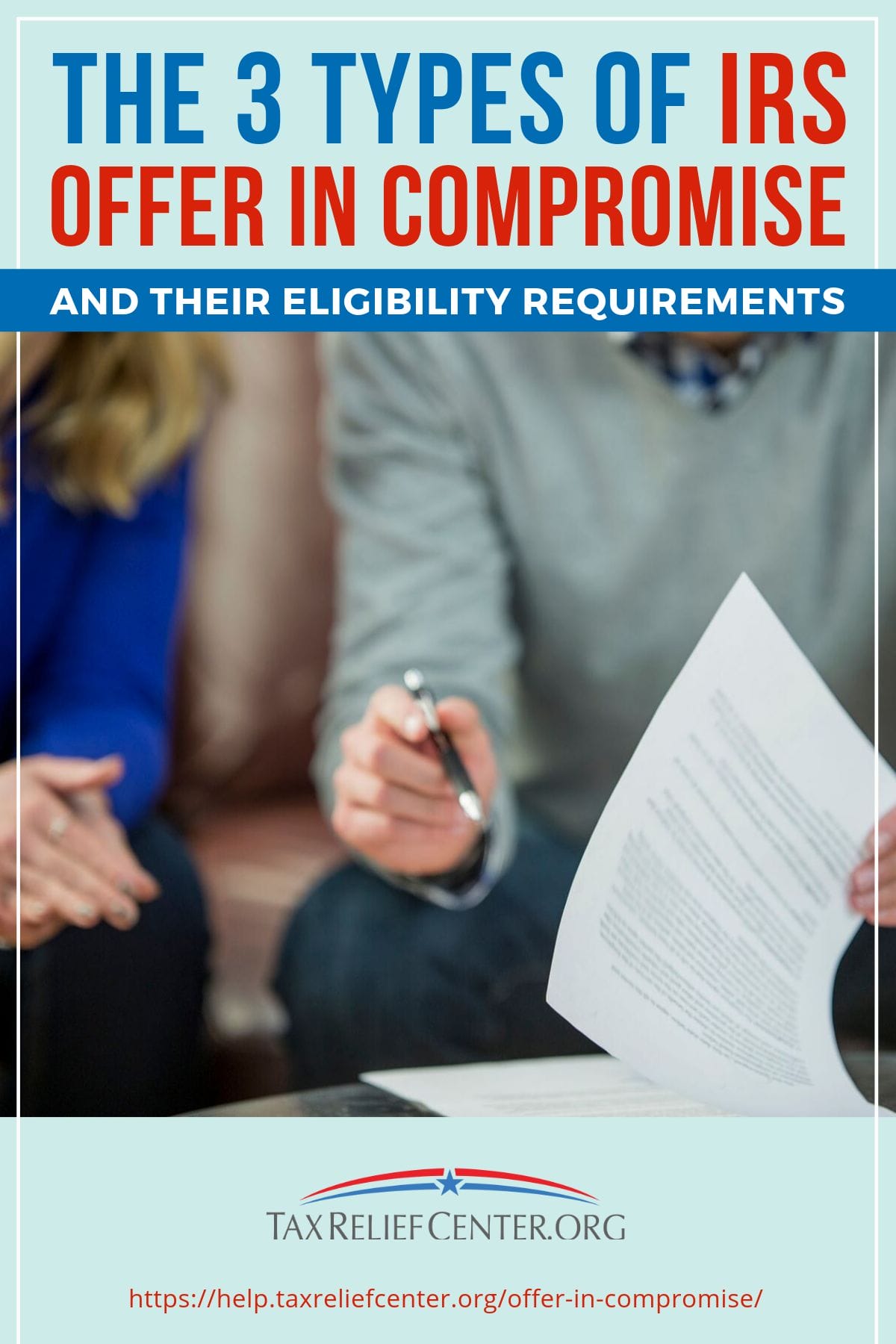The IRS Offer in Compromise has three programs in place to aid qualified taxpayers in resolving their back taxes.
RELATED: IRS Offer In Compromise | What It Is And How Can It Help You
In this article:
Exploring IRS Offer in Compromise Options and How To Qualify for Each
1. Doubt as to Collectibility
The IRS knows that it is better to accept an Offer in Compromise from a delinquent taxpayer rather than risking zero collection. This is why they assess the potential collectibility of back taxes.
Collectibility assessment covers three considerations.
- The potential outcome of forced tax collection versus accepting a taxpayer’s offer.
- The probable financial future of a delinquent taxpayer.
- The possibility of third parties questioning the agreed Offer in Compromise between a taxpayer and the IRS.
You have a better chance of being granted an offer if the IRS deems forced tax collection riskier than accepting your offer. They will reach this conclusion if your financial situation does not look too promising.
Furthermore, the IRS will also gauge the soundness of your offer in relation to their own interests. If they believe that allowing a taxpayer to pay less than what they owe will put the agency in hot water, chances are, your offer will be denied.
It is also worth noting that it is more difficult for businesses and organizations to qualify for an IRS Offer in Compromise compared to individual taxpayers.
How to Qualify
To know whether you qualify for an Offer in Compromise, the IRS will compute your Reasonable Collection Potential (RCP) by adding your equity in assets and collectability. Here is a basic example:
Equity: Your principal residence is worth $250,000 but is still attached to a $200,000 mortgage. Your equity amounts to $50,000.
Collectability: Your monthly gross income is $4,000 and your monthly household expenses (housing, utilities, food, clothing, health costs, etc.) is $3,800. Your collectability amounts to $200 per month, which adds up to $2,400 for a 12-month payment period.
Your equity in assets ($50,000) plus your collectability ($2400) becomes your required minimum offer, which amounts to $52,400.
If you owe back taxes worth around $60,000, then the IRS will most likely take your offer. Conversely, if you owe less than $52,400, your offer will be denied.
Instead, the agency might offer you an IRS payment plan.
2. Doubt as to Liability

The IRS grants tax relief via Offer in Compromise to taxpayers who question the validity of their back taxes. Yes, tax filing errors happen, whether made by your tax accountant or an IRS agent, and the IRS welcomes appeals resulting from these mistakes.
Doubt as to Liability also extends to taxpayers equipped with documents supporting their claim of miscalculated back taxes. To better your chances of qualifying for this tax relief program, make sure you and your representative refer to relevant tax authorities, such as the Internal Revenue Code, Treasury Interpretations, Legislative Intent, and Judicial Interpretations, prior to appearing before an IRS officer.
Scenarios of Note
To better understand accepted Doubt as to Liability cases, here are a couple of examples.
- You receive a notice of back taxes from the IRS amounting to $10,000. They explain it is from a 2017 audit. You had not been informed about this audit. Then you realize you had a change of address prior to the said audit. This explains why you had failed to receive the audit notice, and, consequently, failed to respond to it. Since you were not able to furnish the IRS with essential documents to carry out their audit, the agency disallowed your declared deductions. The Offer in Compromise Doubt as to Liability option allows you to make a settlement offer of no less than $1. If your receipts support your declared deductions, and you have records to back that you had indeed changed address, the IRS will agree to your offer.
- Your 2016 tax return proved inaccurate. Mistakes were made by your hired CPA, resulting in back taxes amounting to $20,000. Upon careful reevaluation, your new CPA comes up with a new and more accurate computation. You only owe the IRS $5,000 for your 2016 tax return. You can apply for the Doubt as to Liability program and offer the IRS $5,000 to settle your miscalculated debt of $20,000. If the IRS establishes the veracity of your supporting documents, your offer would be accepted.
RELATED: 3 Legal Programs That Will Help You Get Out Of Tax Trouble
3. Effective Tax Administration
In order to qualify for an Offer in Compromise via Effective Tax Administration, you must not have previously qualified for any of the two aforementioned options. To apply for this program, you will have to accomplish IRS Form 656.
Effective Tax Administration covers two subcategories. These are Hardship and Equity or Public Policy.
Effective Tax Administration — Hardship: You are capable of paying your back taxes but doing so will plunge you into a financial crisis.
Effective Tax Administration — Equity or Public Policy: There is an exceptionally remarkable reason for an offer to be allowed, such as in cases of mismanaged agency policies.
Scenarios of Note
To better understand recognized Effective Tax Administration cases, here are a couple of examples.
- You are caring for a disabled family member. You earn enough to pay your back taxes. But doing so would mean you won’t have enough left to afford your disabled family member’s special needs.
- You are retired, with sufficient funds on your 401K. Although paying your back taxes is possible via your 401K fund, doing so would mean you will have to return to the workforce since you will have been financially compromised.
- The IRS agent who handled your tax evaluation made a major clerical error.
- The IRS has provided you with erroneous advice which resulted in your misguided tax filing.
Keep in mind that Offer in Compromise via Effective Tax Administration proves to be the most challenging tax relief case to pull off. If you decide to pursue this option, it pays to have a professional tax consultant by your side throughout the process.
Acceptance of tax debt settlement usually takes at least four months. That is, depending on the amount of taxes you owe.
For back taxes amounting to more than $50,000, expect to wait for at least a year for IRS to decide on your case.
The IRS Offer in Compromise exists to help delinquent taxpayers deal with their back taxes. If you think you meet the qualifications for any of the three options discussed above, it is in your best interest to take advantage of these programs.
Do you have any questions regarding the aforementioned IRS Offer in Compromise programs? Please do not hesitate to share them in the comments section below.
If you owe back taxes, visit taxreliefcenter.org for more information on tax relief options.
Up Next:
- How To File Back Taxes
- Should You Consider Filing For Bankruptcy
- How To Stop, Remove Or Prevent A Bank Levy


